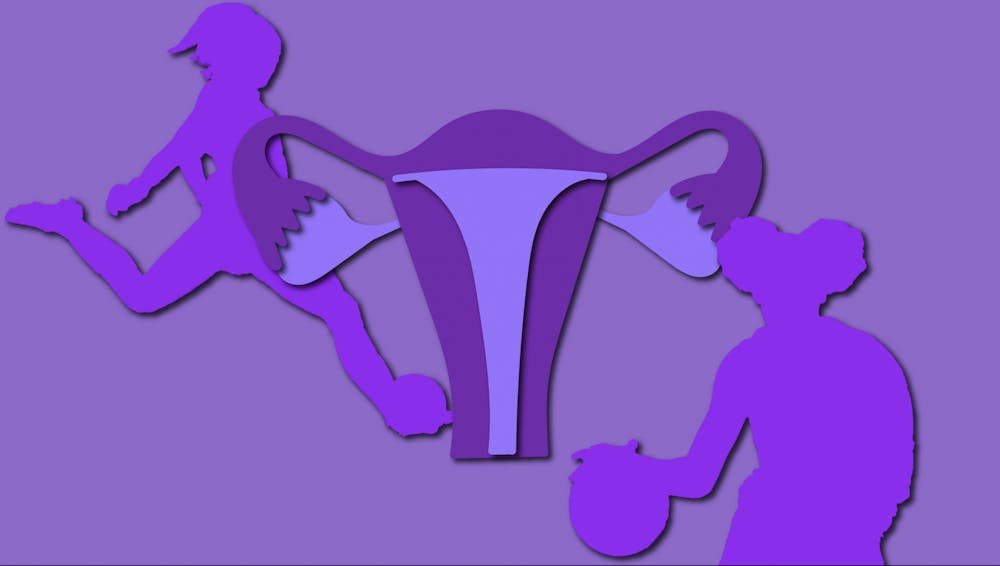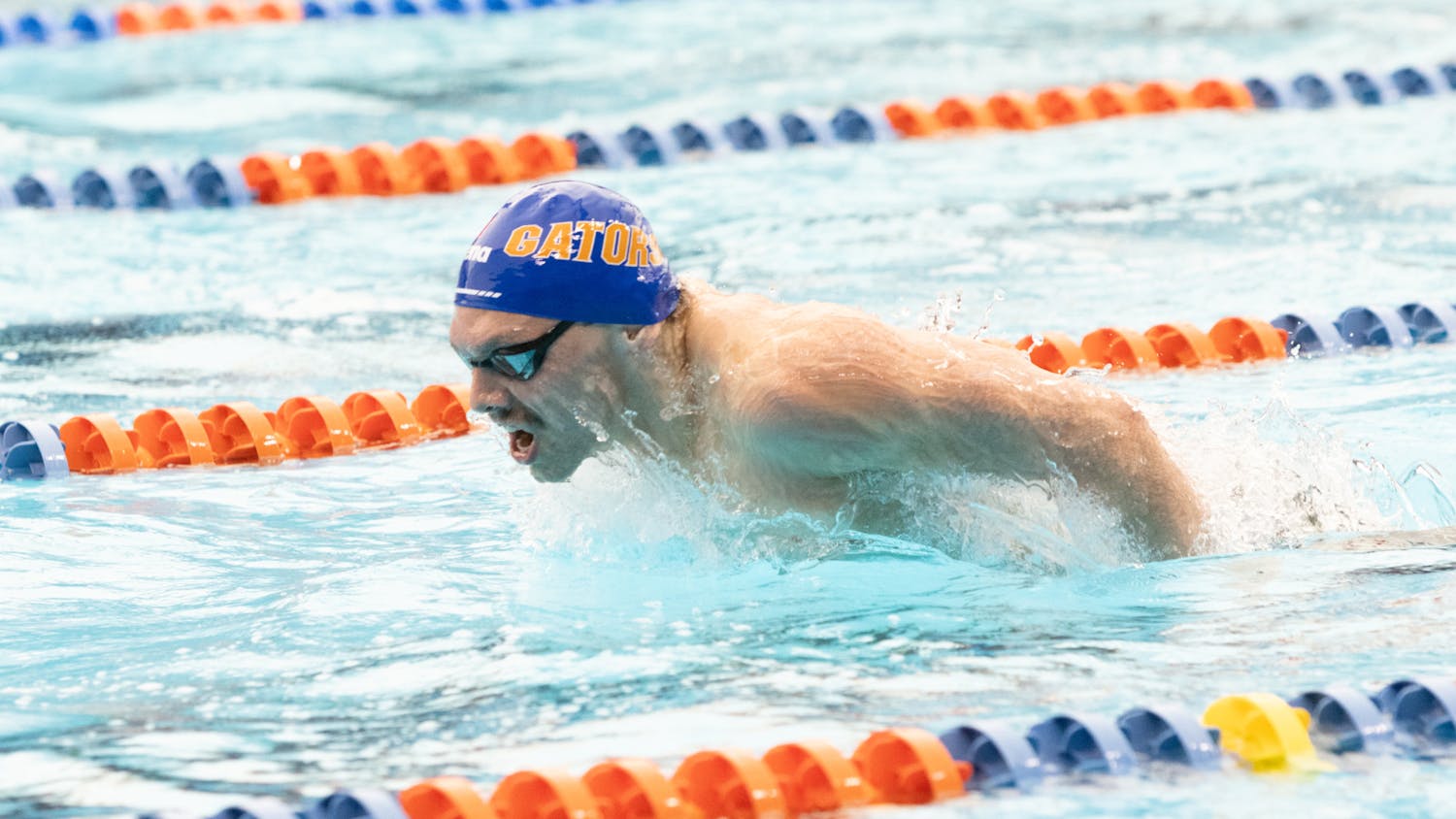In one UF athlete’s mind, reproductive health isn’t talked about enough in sports. And, at least in her experience, not at all in college basketball.
Gators junior forward Jordyn Merritt knows how to dribble a basketball up the court, hit a wide open three-point shot and defend both the paint and the perimeter with an intensity only a dedicated athlete who knows their body’s strengths and weaknesses can manage.
However, off the court Merritt said she also knows her body’s rights. And she isn’t happy.
“Being an athlete, if you happen to get pregnant, that could honestly jeopardize your career,” she said. “Not a lot of people are in the financial spaces or even mentally, physically able to take care of a child. And that could really throw your life off course.”
Merritt is just one athlete who understands the ramifications of Roe v. Wade, the landmark 1973 court ruling that guaranteed nationwide abortion access, being overturned. She hasn’t seen anyone in the athletics department actively reach out to teach athletes about reproductive health in sports, Merritt said.
UF’s 2021-2022 student athlete handbook has 10 pages dedicated to student athlete’s health. There’s no mention of reproductive health.
However, Jocelyn Gravlee, UF associate professor and interim director in student health care, said student athletes receive their care through UF’s Student Health Care Center and the women’s clinic.
“We discuss reproductive health with student athletes in the same way we discuss it with students,” she said.
As an advocate for women’s health, Merritt believes everyone — including athletes — should have a general knowledge on reproductive health, especially with the changing political and social climate.
Merritt learned about the history of Roe at Plano Senior High School, where, at the time, abortion was still federally protected. Since then, she’s become educated about the importance of reproductive health from her UF human sexuality courses she’s chosen to take.
Still, Merritt wishes health instructors would come speak to athletes about reproductive health.
“We have the resources to hire the proper people to educate us,” she said “It's just whether or not it is ever done.”
In 2008, the National Collegiate Athletic Association released “Pregnant and Parenting Student Athletes: Resources and Model Policies” to guide universities on what to do if a student athlete got pregnant.
The handout outlines protections for pregnant athletes such as not excluding them from sport activities on the condition of “pregnancy, childbirth, false pregnancy, termination of pregnancy or recovery therefrom…”
Title IX, a law banning discrimination on the basis of sex, also protects the athlete from being penalized for taking a pregnancy leave. However, the handout states they may not necessarily be reinstated to the specific position they formally held.
With Roe reversed, it’s unclear how states that have banned abortions will respond to a student athlete who’s pregnant — even with the handout.
With Florida’s 15-week ban, it’s also unclear how this may affect UF athletes.
"I can’t speculate on any future revisions or updates," NCAA spokesperson Chris Radford told USA Today, "but the NCAA is continuously evaluating emerging health and safety issues that may directly impact student-athletes and the membership that it supports."
Although reproductive health may be an uncomfortable topic to discuss in athletics because people have varying political and religious beliefs, Merritt said, it needs to be talked about.
“It's just like racism — not everybody wants to talk about that because it’s such a hard topic,” she said. “If you want to make progress, you need to speak about it, you need to have the difference of opinions, you need to be educated.”
Like Merritt, Gators softball first baseman and outfielder Avery Goelz agrees full bans on abortions shouldn’t be legal; however, she said it’s not the athletics program’s job to inform athletes on these matters.
“Our programs are responsible for keeping us healthy so we can play to the best of our ability, but since we are adults I feel it is our responsibility to seek information if we want it,” she said. “I think our sport doesn’t discuss the topic because we already spend a lot of time on our overall health and practice.”
UF’s nutritionist provides the softball team with vitamins and minerals if their bodies are in need of something, she said. They also hold meetings throughout the year to discuss how to stay healthy.
“If we feel something isn’t right with our bodies, we go to our trainers, discuss what the problem might be and move forward from there,” she said.
Goelz hasn’t felt differently since Roe was overturned, she said, which may be because abortion is still legal in Florida and she takes safety precautions.
“I’m sure some of my teammates have a fear about this issue,” she said, “but it’s not something that is really talked about on our team.”
Women ages 20 to 24 had 34% of abortions nationwide in 2014, according to Guttmacher Institute, a reproductive rights research and policy organization. By the age of 45, one in four women, according to the institute, will also have an abortion in their lifetime.
And for women ages 18 to 24, sexual assault is at a higher risk, according to the Rape, Abuse and Incest National Network.
UF Assistant Athletics Director Denver Parler and several UF coaches reiterated health as being the greatest importance to the athletic department.
“Student-athlete health and well-being are of the greatest importance to us, and our policies, commitment of resources, and care provided reflect that,” Parler said. “Our goal is to empower student-athletes to take ownership of all facets of their lives, including healthcare. We will continue to provide exceptional medical care and support to all student-athletes.”
Parler and several UF communications specialists — including Senior Associate Athletics Director Steve McClain, gymnastics and soccer communications director Mary Howard, volleyball and lacrosse communications director Katie Callahan and swimming and diving communications assistant Nick Yuska — declined to comment further on the specifics of what this care entailed and if there’s a concern among UF student-athletes and professionals in abortion access.
Contact Isabella Douglas at idouglas@alligator.org. Follow her on Twitter @_issadouglas.

Isabella Douglas is a fourth-year journalism major and the Fall 2023 editor-in-chief for The Alligator. She has previously worked as the digital managing editor, metro editor, criminal justice reporter and as a news assistant. When she isn't reporting, she can be found reorganizing her bookshelf and adding books to her ever-growing TBR.






